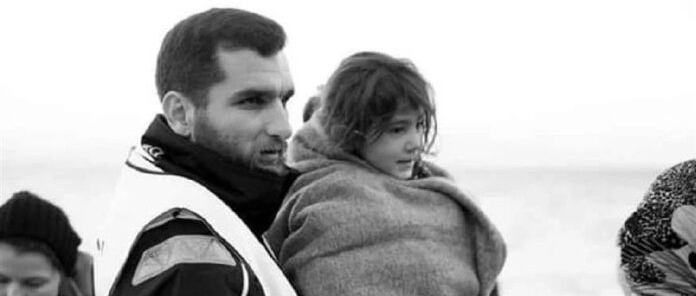On 13 January the Lesvos Court of Appeal unanimously decided to withdraw the misdemeanor charges in a case known as “Sarah Mardini”. Sarah Mardini, a Syrian refugee herself who then became a rescuer, got widely known through the Netflix film “The Swimmers”, which chronicles her story. 24 people in total, Greeks and foreigners alike, were charged with espionage, forgery and illegal listening to radio frequencies, essentially for providing humanitarian aid to refugees in Lesvos. Those charges were dropped earlier this year. Nevertheless, the 24 rescuers are still faced with the possibility of being charged and tried for felonies such as human smuggling, being part of a criminal organisation and money laundering. If found guilty, they may end up with prison sentences of up to 25 years. Although no charges have yet been filed, facing a trial in the future remains an open possibility for them.
Xekinima, the Greek affiliate of Internationalist Standpoint, spoke with Nassos Karakitsos, head of the humanitarian organisation ERCI (Emergency Response Centre International), who is one of the 24 accused volunteer rescuers.
Q: Nasso, is there still a case against the 24 volunteers, after the misdemeanor charges withdrawal? Do you have any assessment as to why the case is dragging on?
NK: The trial involving the misdemeanor charges ended after 5 years. Now we are waiting for the felony trial to be set. We need to keep in mind that the inquest was closed after 5 years, during which time the case did not progress at all. Thanks to the pressure from our lawyers, the case file has been transferred to the Appeals Board, which is responsible for deciding whether the case should be sent to hearing (i.e. a trial) or discharged and filed, due to lack of evidence. We are not aware when this decision will be taken. The charges against us are serious and carry sentences of hundreds of years in prison. Espionage, secrets of state, criminal organisation, money laundering and facilitation of entry are just some of the charges against us, which are threatening our future and our lives.
It is obvious that the lack of evidence, the sloppiness and the authorities’ rush to ‘establish’ a case out of nothing, has led to a quagmire and has caused embarrassment to our persecutors. On the other hand, the present situation is convenient for them, even without a trial or conviction: in this way, fear lingers and sets a barrier to those wishing to offer and help people in need.
Q: Who would benefit from this and what purpose would a possible conviction of yours and the other 23 refugee rescue volunteers serve?
NK: The targeting and the criminalisation of solidarity is a very powerful weapon that all governments use in their desire to maintain fear through mock trials such as ours. Should we be convicted, it would for sure have a negative impact and would make those who wish to help their fellow human beings, fearful and anxious. It would certainly be a victory for the far-right rhetoric of hatred and intolerance, which would bring horrible consequences, setting Greece and Europe many years backwards.
Q: Would you please talk to us about what the situation for refugee rescues in the Aegean looks like at this moment, compared to the period when you decided to become a volunteer refugee rescuer yourself, back in 2016?
NK: My personal experiences are very different from what I hear and see happening in the Aegean today. I have seen thousands of people from all over the world coming to help and offer what they were able to. It was something unprecedented and so powerful that gave hope and fulfilled one as a human being. Back then, I had also witnessed the authorities working together to rescue people, and putting great effort into the task. With all their crookedness, their gaps, their shortcomings – and their frequent obstructionism – they were cooperating with voluntary groups and organisations and sharing a common purpose, the rescue of people who were in danger. In too many cases they sought help and experience from volunteer rescuers.
Today things are unfortunately so different and sad. What I hear and see causes deep sadness and anger in me. The authorities take up a watchdog role at best, while people drown at sea. Push-backs are now the standard practice, leading desperate people to even more dangerous and risky attempts to reach Greece and Europe, resulting in thousands of human lives being lost. People drowning in the waters of the Aegean, of Evros River and the Mediterranean Sea are beyond my comprehension. It is very unfortunate.
Q: Do you think that this situation can change? How?
NK: It is widely known that Greece and the EU are applying the policy of illegal refoulement, the violation of fundamental human rights as well as the denial and – in many cases – obstruction of solidarity and assistance to people in need. Unfortunately, these policies and their implementation have a direct impact on the lives of people seeking asylum and a better life. With no regard for human lives, the implementation of these policies is aimed at preventing, through fear, asylum-seeking on European territory.
Naturally, anyone who wants to help and assist is confronted by governments which, following the same pattern, promote and maintain fear, criminalising solidarity, inventing ways and legislations with the obvious aim of preventing and obstructing it.
In my opinion, and unfortunately in my personal experience, there is no reason for being optimistic that anything will change for the better, at least in the near future. Europe seems to be indifferent and essentially doing its job, turning a blind eye and whistling indifferently in the face of the crimes that current governments are contributing to (human rights violations, refoulements, etc.).
Netflix's new movie "The Swimmers" tells the story of a Syrian refugee who became an Olympic swimmer. pic.twitter.com/HnalKvrDiC
— AJ+ (@ajplus) December 3, 2022



